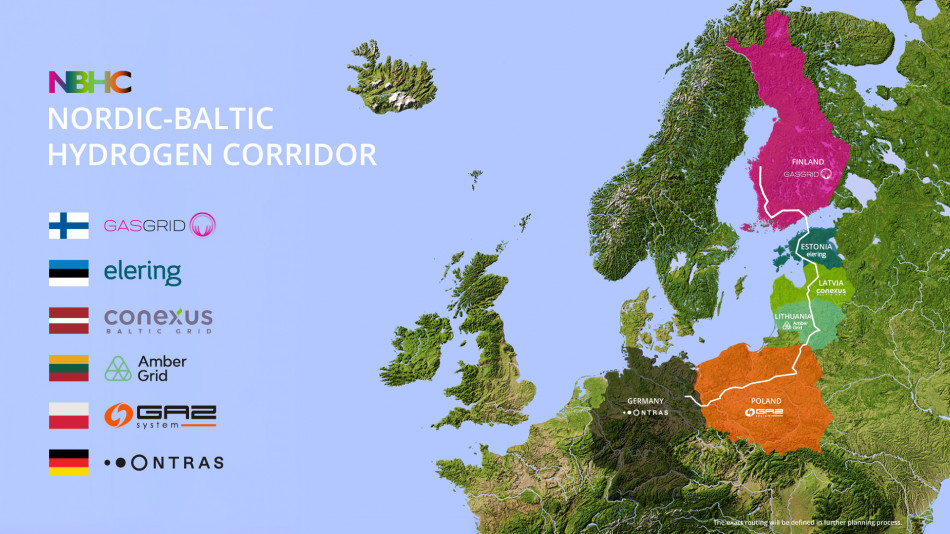Gas transmission operators complete pre-feasibility study
European gas transmission system operators Conexus Baltic Grid (Latvia), Gasgrid Finland (Finland), Elering (Estonia), Amber Grid (Lithuania), GAZ-SYSTEM (Poland) and ONTRAS (Germany) have successfully completed the feasibility study for the North-Baltic Hydrogen Corridor. This important study, launched in January 2024, sets out the main prerequisites for the development of a Nordic-Baltic Hydrogen Corridor to transport renewable hydrogen between the six countries.
The study provides a comprehensive overview of the technical, legal, organisational and economic aspects that need to be taken into account for the implementation of the hydrogen corridor. This corridor will play a crucial role in achieving the European Union's (EU) decarbonisation targets using hydrogen produced and supplied within the EU.
The Nordic-Baltic region offers significant renewable hydrogen potential, identified in the feasibility study at around 27.1 million tonnes by 2040 (based on combined onshore and offshore wind and solar). This represents a major potential for hydrogen market development and export to continental Europe, which the Nordic-Baltic Hydrogen Corridor seeks to address.
By 2040, up to 2.7 million tonnes (Mt) of renewable hydrogen is expected to be transported annually between the participating countries through the corridor. The feasibility study concludes that the Nordic-Baltic Hydrogen Corridor could become one of the first international hydrogen pipelines in Europe. The corridor pipeline is currently planned to be 48 inches (1 200 mm) in diameter, with several compressor stations and a length of about 2 500 km.
"With this joint project, we, as transmission system operators, are laying the foundations for the growth of the hydrogen market in the six Member States of the European Union. Cross-border cooperation between producers, infrastructure operators and consumers will be an important building block for a successful energy transition in Europe," said the project partners.
"The feasibility study has been successfully completed and, in the next phase of the study, it is important for all parties involved to develop more detailed plans for the development of the project and to assess a possible timetable for implementation. The hydrogen corridor will form the basis for a regional hydrogen market and could offer new business opportunities in Latvia. It is essential that the project is implemented in accordance with the needs and resources of the region, ensuring a positive impact on the local and regional economy. In addition, it supports the transition to green energy by promoting more sustainable and environmentally friendly energy production, which is essential to meet national and EU climate targets," said Uldis Bariss, Conexus Chairman of the Board.
The North-Baltic Hydrogen Corridor project is an important part of Europe's transition towards a sustainable and decarbonised energy system, supporting the EU's climate goals and promoting regional energy cooperation. The North-Baltic Hydrogen Corridor will contribute significantly to the EU's decarbonisation objectives by integrating renewable hydrogen in six EU Member States. By 2050, the corridor could reduce carbon emissions by up to 37 million tonnes of CO2 per year. The corridor will improve energy security and diversity of supply in the region and Europe by connecting local renewable hydrogen production to existing and emerging demand centres, and will facilitate decarbonisation in sectors where reduction of emissions is particularly challenging.
In April 2024, the European Commission officially granted the Nordic-Baltic Hydrogen Corridor the status of a European project of common interest as part of the "Baltic Energy Market Hydrogen Interconnection Plan". The status of a European project of common interest brings various advantages, such as the right to apply for European Union project funding and accelerate the procedure for receiving necessary permits.
Based on the results of the feasibility study, the European gas transmission system operators now plan to start work on further studies, including a detailed technical analysis of the project as well as a commercial and economic assessment.

